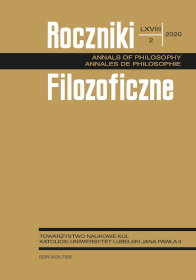The Curious Sensations of Pain, Hunger and Thirst. Reliabilism in the Second Part of Descartes’ Sixth Meditation
Abstrakt
Osobliwość takich doznań, jak ból, głód i pragnienie. Reliabilizm w drugiej części szóstej Medytacji Kartezjusza
Artykuł omawia epistemiczny status cielesnych doznań takich, jak ból, głód i pragnienia, o których mowa w drugiej części szóstej Medytacji Kartezjusza. Argumentuję, że ów fragment stanowi integralny komponent epistemologicznego programu, który można znaleźć w Medytacjach. Na ogół widzi się Kartezjusza jako zwolennika infallibilizmu, internalizmu oraz fundacjonalizmu. Tymczasem w odniesieniu do wiedzy i przekonań opartych na doznaniach cielesnych przyjmuje on fallibilizm, eksternalizm i reliabilizm. Na rzecz tego wniosku przemawia z jednej strony, analiza tego, czego naucza nas – według Kartezjusza – natura przez wrażenia bólu, głodu i pragnienia, z drugiej strony jego analiza błędów, którym podlega nasza natura, przeprowadzona przeze mnie z wykorzystaniem zaproponowanego przez Wilfrida Sellarsa podziału na logiczną przestrzeń rozumu oraz empiryczną przestrzeń przyczyn.
Bibliografia
Armstrong, David M. Bodily Sensations. London: Routledge and Paul, 1962.
Armstrong, David M. A Materialist Theory of the Mind, 306–22. London: Routledge and Paul, 1968.
BonJour, Laurence. Epistemology. Classical Problems and Contemporary Responses. Lanham: Rowman and Littlefield Publishers, 2002.
BonJour, Lawrence. “A Version of Internalist Foundationalism.” In Laurence BonJour and Ernest Sosa, Epistemic Justification. Internalism vs. Externalism, Foundations vs. Virtues, 3–96. Oxford: Blackwell Publishing, 2003.
BonJour, Lawrence. “Internalism and Externalism.” In The Oxford Handbook of Epistemology, edited by Paul K. Moser, 235–63. Oxford: Oxford University Press, 2002.
Cottingham, John. “The Mind–Body Relation.” In The Blackwell Guide to Descartes’ Meditations, edited by Stephen Gaukroger, 179–92. Oxford: Blackwell Publishing, 2006.
Cottingham, John. “Descartes and Darwin: Reflections on the Sixth Meditation.” Proceedings of the Aristotelian Society Supplementary Volume 87 (2013): 259–77.
Detlefsen, Karen. “Teleology and Natures in Descartes’ Sixth Meditation.” In Descartes’ Meditations: A Critical Guide, edited by Karen Detlefsen, 153–75. Cambridge: Cambridge University Press, 2013.
Rodis-Lewis, Geneviève. “Descartes and the Unity of the Human Being.” In Descartes, edited by John Cottingham, 197–210. Oxford: Oxford University Press, 1998.
Goldman, Alvin I. “Internalism Exposed.” In Alvin I. Goldman, Pathways to Knowledge, 3–23. Oxford: Oxford University Press, 2002.
Goldman, Alvin I. “A Causal Theory of Knowing.” The Journal of Philosophy 64 (1967): 357–72. Goldman, Alvin I. “What is Justified Belief?” In Justification and Knowledge, edited by George S. Pappas, 1–23. Dordrecht: D. Reidel, 1979.
Hoffman, Paul. “The Union and Interaction of Mind and Body.” In A Companion to Descartes, edited by Janet Broughton and John Carriero, 390–403. Oxford: Blackwell Publishing, 2008.
Morris, John. “Descartes and Probable Knowledge.” Journal of the History of Philosophy 8 (1970): 303–12.
Manning, Gideon. “Extrinsic Denomination” in The Cambridge Descartes Lexicon, edited by Lawrence Nolan, 276–78. Cambridge: Cambridge University Press, 2016.
Newman, Lex. “Error, Theodicies of.” In The Cambridge Descartes Lexicon, edited by Lawrence Nolan, 240–46. Cambridge: Cambridge University Press, 2016.
Patterson, Sarah. “Descartes on the Errors of the Senses.” Royal Institute of Philosophy Supplement 78 (2016): 73–108.
Ragland, C. P. The Will to Reason: Theodicy and Freedom in Descartes. Oxford: Oxford University Press, 2016.
Rozemond, Marleen. “Descartes, Mind-Body Union, and Holenmerism.” Philosophical Topics 31 (2003): 343–67.
Sellars, Willfrid. Empiricism and the Philosophy of Mind. Introduction by Richard Rorty and Study Guide by Robert Brandom. Cambridge, MA: Harvard University Press, 1997.
Wilson, Margaret D. “Descartes: The Epistemological Argument for Mind-Body Distinctness.” Noûs 10, no. 1 (1976): 3–15.
Copyright (c) 2020 Roczniki Filozoficzne

Utwór dostępny jest na licencji Creative Commons Uznanie autorstwa – Użycie niekomercyjne – Bez utworów zależnych 4.0 Międzynarodowe.





